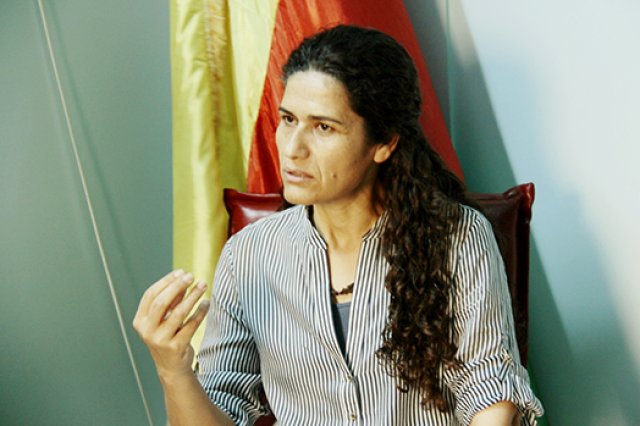
İlham Ehmed is Co-President of the Syrian Democratic Council, the political body with which the Syrian Democratic Forces (QSD) are affiliated, and a leading representative of the Kurdish-led Rojava Revolution in Northern Syria.
She spoke to Firat News Agency on February 22 about the QSD's recent gains and Turkey's bombardment, and threatened invasion, of Rojava.
* * *
What is your evaluation of Turkey's recent escalated attacks on Rojava?
This is not the first time Turkey attacks Rojava, it has been attacking for a while now. Turkey has been hostile towards Rojava since the beginning of the revolution here. Turkey does not want the formation of a political will and the solution of the problems in Rojava. For these reasons, Turkey sometimes supports gangs targeting Rojava and other times shells Rojava itself. Turkey has increased its shelling of Rojava recently for multiple reasons.
Turkey has claimed that its recent attacks aim to prevent the QSD's military operations targeting Azaz, but this is not the case.
The actual reason for Turkey's attacks is that Turkey is out of the political equation in Syria and attempts to become a player in the region by attacking Rojava.
The majority of the opposition forces in the region are loyal to Jabhat Al-Nusra, and all of these groups have been under the protection of Turkey. These groups are proxies with no political program, which is why they ran away after recent Russian bombardments. This situation enabled the recent advances of the Syrian regime.
What is the QSD policy on this issue?
The QSD has been trying to prevent the advance of regime forces by capturing the areas evacuated by jihadis. Turkey has been upset at this QSD stance and increased its attacks on Rojava. With its attacks, Turkey is trying to tell the international community that it is influential in this region and should be taken seriously.
Turkey blamed the Syrian Kurdish-led Peoples Protection Units (YPG) – the largest component of the QSD – for the February 17 attack against a military convoy in the Turkish capital, Ankara. What was Turkey's goal here?
By blaming the YPG for the attacks, Turkey wanted to portray the YPG as a terrorist organisation and create the grounds for the attack it wants to carry out against Rojava. With this accusation, Turkey also wanted to stop the international support to and the military coordination with the QSD.
Turkey tried to link the attack to the YPG and argued that the attacker was from Amude, but this attempt failed. Turkish officials met with the representatives of international powers right after the attack but their claims were not bought. Turkey's claims are false because YPG never targeted Turkey even during the attacks and bombardments targeting Kobanê. YPG is relatively more comfortable now, and does not have a strategy of attacking Turkey. YPG'S main strategy is defeating ISIS and realizing a democratic change in Syria. Turkey's false accusations did not convince anyone.
Why does Turkey attach this much importance to Azaz, or is the main thing really about Azaz?
Turkey wants to control the Azaz gate because it dispatches arms to the gangs through that border crossing. Turkey is disturbed over the closure of the road between Azaz and Aleppo because it was the area from which Turkey would spread its policy; through that border crossing and Aleppo to the entire Syrian territory. After the closure of this road, Turkey got stuck and therefore started to bring Azaz into question. Apart from this policy, Azaz means nothing to Turkey.
Yet, it must be known very well that QSD will be fighting the ISIS terror everywhere it exists. The areas where QSD have made advances so far are those held by Al-Nusra which is listed among the terrorist organisations. Nobody can question our progress in this territory. Those not acting with Al-Nusra in these areas are joining the ranks of the QSD and defending themselves. Our goal is to unite the forces acting separately from Al-Nusra and wage a harsh struggle against both ISIS and Al-Nusra.
What will your response be in the event that Turkey continues its aggression on Rojava?
We do not believe Turkey can resume this policy because of the fact that Turkey is suffering heavy and unresolved problems within its own borders. As a matter of fact, Turkey makes such a noise in an effort to hide its internal situation from the world.
The Turkish state is committing a massacre against the civilian people in Amed, Sur, Nusaybin, Cizre, Silopi and many other areas, and this state of affairs is already on the world agenda. Turkey is receiving criticism in this regard, because of which it wants to catch the attention on Rojava in order to hide its own failures.
Turkey has to stop its attacks and abandon this approach towards Rojava. It has no right to bomb Efrîn or Til Rifat where there are civilians. These acts do not serve Turkey's interests anyway. Turkey must be convinced that it cannot bomb its neighbors whenever it wants. This is a different region, a different border and a different land with credit. Turkey must respect the international rules. The United Nations has called upon Turkey to obey these rules. In this regard, our policy is not focused on scaling up this issue. We are acting otherwise.
We have not declared a war against Turkey so far, nor will we adopt such a stand but Turkey must stop its bombardments. Our patience has limits.
Like the article? Subscribe to Green Left now! You can also like us on Facebook and follow us on Twitter.